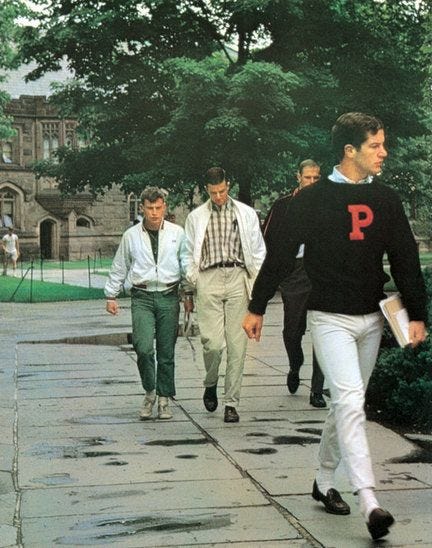When former Chinese Premier Zhou Enlai was asked in the 1970s about his evaluation of the impact of the French Revolution, he supposedly responded, “It’s too soon to tell”1. This is similar to how I feel about the impact of college on me. I’m going to my 10 year Princeton reunion this weekend, and I feel like I finally am able to start to understand how I was affected by Princeton.
For a long time, the strongest, most overriding feeling I had about my time at Princeton was disappointment. I came into Princeton passionate, smart, well-read, and angry about how the world wasn’t up to my standards. I wanted to overturn the established order, and I thought Princeton would help me do it.
This was, in retrospect, naive. Princeton was never a school for radicals. In its heyday, it had been a finishing school, preparing students to take their place among the elite of society. Some parts of Princeton still took that charge seriously, like the surprisingly strong computer science and math faculties, who prided themselves on a rigorous education that would help Princetonians take their place in the top graduate programs or most prestigious companies.

But most of Princeton had forgotten even that. Princeton suffered from the same metastasis as the rest of academia, as a growing research program and even more rapidly growing administration took energy away from the cultivation of undergraduates. My experience with Princeton faculty was mostly that of neglect, and with administration, active antagonism.
My classmates, by contrast, were neither neglectful nor antagonistic. Most of them cared, a lot, about good grades on the weekdays and getting drunk on the weekends. I was the exception, in that I cared about neither of those. I didn’t see the point of getting good grades in classes I didn’t care about: I had done that in high school, and look where that had landed me (Princeton). I also didn’t particularly want to get drunk and play beer pong: I had seen alcohol and drugs consume my friends in high school, and I didn’t like it then, either.
Combine this with my naturally rebellious personality, which, believe it or not, has softened over time, and I was a bad fit at Princeton. I had some friends, for sure, and even a professor or two who liked me. But I also pissed off a lot of people. A short list:
1. The dance community, by making it clear that I considered myself to be a better dancer and choreographer than them and also having zero interest in ingratiating myself
2. The charity/volunteer community, by campaigning to measure the efficacy of their efforts
3. My junior paper advisor, by first refusing to listen to his advice on my research, and then, when my research turned out well, refusing to let him get authorship on a paper
4. My senior thesis advisor, by refusing to listen to his advice on my research. There’s no second part to this, because this one didn’t turn out so well.
By the time I graduated Princeton, I had run into every metaphorical wall that existed at Princeton. I had pissed off or been pissed off by the extracurricular community, the study abroad community, the research community, and the magazine writing community (failed coup, don’t ask). Part of this was me: I was an angry young man. But part of this was me being an intellectual radical in a place that wasn’t friendly towards intellectuals or radicals.

I was unable to think about Princeton for a long time afterwards without strong feelings of anger and disappointment. Even when catching up with old Princeton friends, I would still bitch about Princeton during our reminiscences. It’s only recently that I’ve been able to remember Princeton without a tinge of regret, even if it’s just for a moment.
Let me take advantage of that now. I can safely say that who I am today was shaped by my college experience. College was the first time I was ever around people who weren’t middle class white people from Connecticut or Rhode Island for an extended period of time. It was also the first time I failed an exam, the first time I had a bad breakup, and the first time I flew on a plane by myself.
College taught me to work hard, and to find the joy in it. It also taught me the limits of my abilities, what it was like to be a small fish in a big pond, and how it felt to deliberately forge an identity without your representation preceding you. I met classmates with famous last names and professors who were regularly quoted in the New York Times, and found I didn’t have much in common with any of them. I had a best friend, several girlfriends, and nobody who I could call a mentor of any sort.
College gave me space and time away from the place of my upbringing and the people who raised me, and a chance to reexamine how my early years shaped me. I realized ways in which I was very lucky, and ways in which I wasn’t. I felt sometimes grateful and sometimes sorry for myself, and had to learn to live with both.
In the end, if I knew what I knew now, would I attend Princeton all over again? Definitely not. There were schools and places that would have been a way better fit for me. But I did go to Princeton, from 2011-2015, and it defined who I am today in many ways. And now it’s been 10 years, and I’m going back.



Nice Take Ivy nod
Have fun, Trevor. Why are you going?